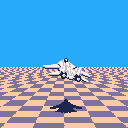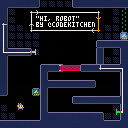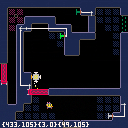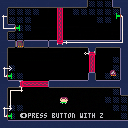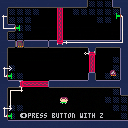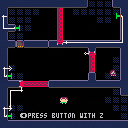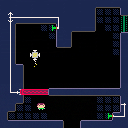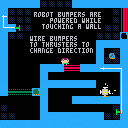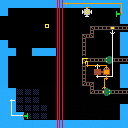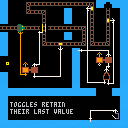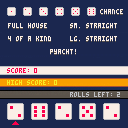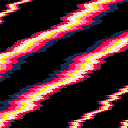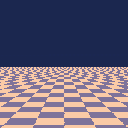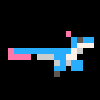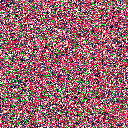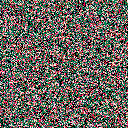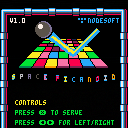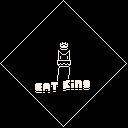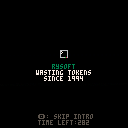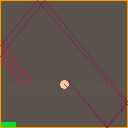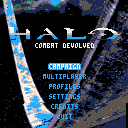I know this isn't strictly speaking Pico-8 related but I'm not much of a programmer and I get the feeling that a lot of the clever techniques that I see used here are...um...algorithmically standard things in terms of doing 2D graphics and movements and things like that and can probably be used in any 2D game programming language/library.
Does anyone know of any 2D gamedev resources to learn more that explain the math/algorithms involved in simple 2D games and effects? I've done exactly one game in Pico8 and it took a very long time because I don't know how to implement things that appear to be standard 2D videogamey things. Absolutely everything I know about game programming is in that game and it's basically just Pong (again).
Sorry for the off-topicness and potentially vague question.






This entire cart is 243 characters (plus six sprites). The code is just:
k,f,q,b=64,0,sqrt,btn x,y=k,k::a::cls(12)for j=3,k do s=j/4 sspr(q(q(s))*16-f%8/4,1,k+k,1,k-j*32,k+j,k*4*s,1)end r=b(1)p=22 if(r)x+=2,p=16 if(b(0))x-=2,p=16 if(b(2))y+=1,p=k if(b(3))y-=1,p=70 spr(28,x+8,99,4,2)spr(p,x,y,6,3,r)flip()f+=1 goto a |
It was a successful attempt to code the basics of a game in two tweets. There's actually enough room to clamp x and y to the screen. I hope someone will use this as a starter to make a real game.




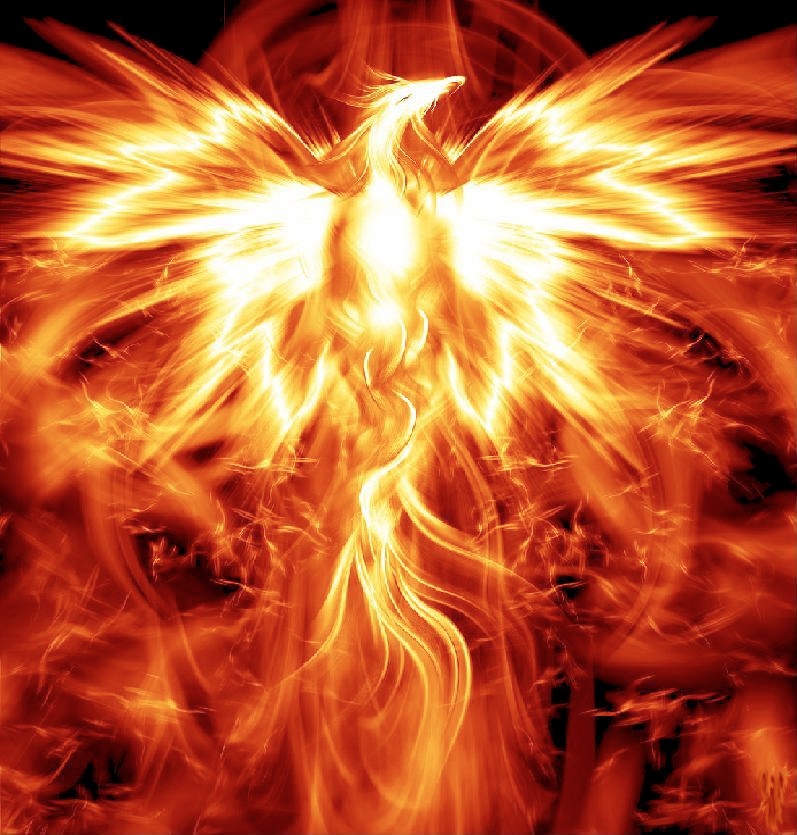

Maybe it's just because it's late and I'm a bit fried...but hoping another set of "eyes" can help me think about map numbers.
I'm making another shmup. I have a map that is full-width and full-height (16,64) serving as the background. I have the map moving down with viewport being the bottom 16x16 of the map. So the initial map placement on screen is 0,-384
map(0,0, 0,-384, 32,128) |
I have a bunch of flagged sprites in the map that can be hit by bullets. I know how to use fget+mget to check the sprite flag.
The issue I'm having is how to get the x/y of the map tile while it's moving.
I know I need to use the bullet's x/y but I don't know how to match that up to the tile on the map that is scrolling by. I'm guessing it's some sort of offset(?) but I don't know what that would be or how to calculate it into a map tile position.
I'm moving the map down by .25 each tick. It's something that I need to track when a map row goes off the bottom of the screen or something...I dunno...my brain hurts. If you think of something, please share...maybe this will make more sense by lunchtime tomorrow :)
mapy=-384 function _draw() cls() map(0,0, 0,mapy, 32,128) mapy+=.25 end |

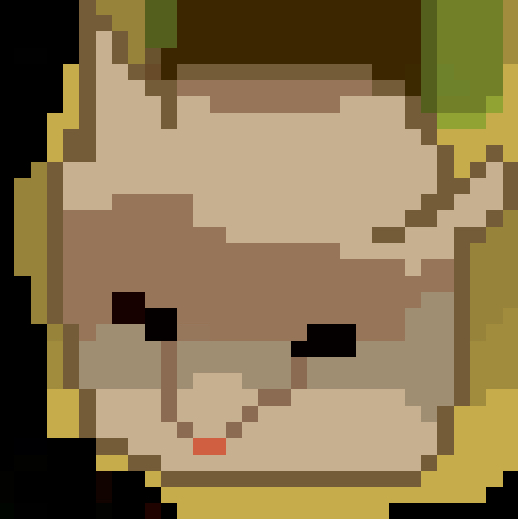
Hey, fellow Picos.
I am currently working on a book aiming to teach kids code games with PICO-8. Target audience is aged 8-14, so it will be a quite slow, careful approach suitable for all kinds of beginners, not just kids. I am writing it in both english and german (will have to have the english proofread though) and plan to initially fund it on kickstarter.com.
I would love to showcase some of the bestlooking games in it to show what's possible with Pico, will be going to approach some of you eventually to ask for your permission.
I have been teaching game development for kids for some years in a primary school and currently teach marketing- & management-students to make games using Pico.
If this sounds interesting to you, I'll keep you posted in here.
Best,
Tassilo



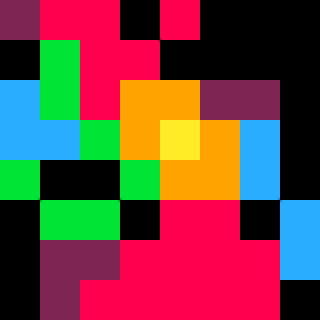






Like Yahtzee, but nacht—I mean, not. The rules slightly differ from Yahtzee. You can read about it on Wikipedia here.
Controls
[o]/z: hold die/select scoring category
[x]/x: roll
left/right: choose die and scoring category
up/down: switch between rolling and scoring
I made this a while ago, but never made the finishing touches (like a title screen). I still haven't, but I thought I'd upload it anyway.
Why settle for single renderings of a Mandelbrot when we can smoothly zoom in?
Features:
--Dithered Palette Animation
--Smooth Bilinear Zoom from sprite buffer
--Background Rendering of Mandelbrot into a (third?) buffer
The way this works is that we graphically zoom into initially rendered view of the Mandelbrot from the sprite buffer. While doing this, we are drawing the next level of Mandelbrot zoom into a second background buffer. When it's done, this gets copied into the zoom/sprite buffer. Lather, rinse, repeat.
Overall, a neat effect I think. Though, I wonder if I should trade the (more or less) smooth frame rate and dithering for less chunky pixels.
Also, I realize that I am awful at spelling "Mandelbrot".
-Electric Gryphon

Lesson: DON'T POKE VRAM.
Or poke anything for that matter.
Results: cartridge.
How did I manage to do this? I do not know in the slightest.
Anyways, enjoy.
EDIT: It also messes up audio.
-- WARNING --
Shrill and loud sound in the beginning!
THIS CODE MESSES UP YOUR PICO-8 SESSION!
DO NOT, I REPEAT, DO NOT RUN THIS IF THE SESSION IS IMPORTANT!
The colours in the shell WILL go weird after using this!
Please restart your PICO-8 with REBOOT or SHUTDOWN after using this!
-- New and improved version! --
No more shrill sound!
-- OLD VERSION --
[Warning!]
Loud sound in the beginning!

First Pico-8 game. Sorry it's Pong/Arkanoid again :) This is pretty much done simply because I can't think of anything else to add. I had to learn Lua at the same time so the code is probably pretty horrible. I'll update it for bug fixes and that but I'm probably going to move onto something else after this.
- 16 levels.
- 7 power ups.
- Persistent high-score.
- Whizzy particles.
Yeah, I guess that's it. Many thanks to the Pico-Hero guy for getting me started.



But is there any guides to installing this on a Raspberry Pi 3 that's running Raspbian? I've managed to transfer over the files and extract the folder but I have no clue as to how I'm supposed to run the program. I did make sure to download the rPi version as well.
Sorry if it's a bit of a newbie question. Just really want to try this thing out :)
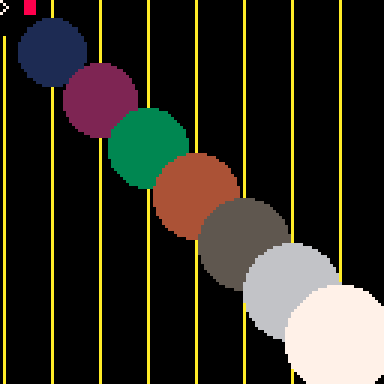

I know this is a small thing, but I often forget to quit pico-8 and I leave it running in the background overnight, which prevents my Mac from sleeping. Maybe it could be tweaked so that pico-8 only blocks the display from turning off/computer from sleeping when it's in run mode?
I tracked it down to pico-8 by running pmset -g assertions which showed:
pid 164(coreaudiod): [0x001a40d7000197e9] 11:05:27 PreventUserIdleSystemSleep named: "com.apple.audio.AppleHDAEngineOutput:1B,0,1,1:0.context.preventuseridlesleep" Created for PID: 93582. |
PID 93582 is pico-8. So it appears it's because it's keeping the audio channel open.


Hey guys,
I wrote a bash script to download/ rename carts from the bbs,
you can download a single thread, or the whole index (50 carts per page), you can also dump carts from your favorite section.
The script rename the cart to include metadata, the downloaded PNGs looks like that:
funfetched_nanoman-1.0_29017_38515.p8.png |
the name is arranged with the following structure, uou can easily customize it in the script:
$AUTHOR_NAME"_"$GAME_TITLE"_"$BBS_ID"_"$GAME_ID".p8.png |
So it runs on linux/bash, it might work under windows 10 bash (?), not sure i never tried the OS ; tell me :]
I'm not a bash expert, it just works :) if you have suggestion or tips, i will gladly read your comments!
link: https://github.com/kikookoubis/pico-8-carts-bash-downloader


- This is a test to create some echo effect. Initially intended for a game I made (Into the Darkness).
- The echo simulation is very simple: a sound is played from a given source point in a given direction. The sound propagates at a given speed in this direction and with a given aperture. As it propagates, it is attenuated and reflects on the walls (ideal reflection) with a given absorption.
- All the parameters (initial position, direction, sound speed, aperture, attenuation, absorption) can be set before launching the simulation.
- Once the simulation launched, the source can then move and becomes a receiver. The sound echo can only be heard when the receiver is located at the front of the sound cone (red lines).
Final Project for the Computational Media 164, Professor Adam Smith, Winter 2017
#CMPM164w17
Controls:
Menu:
Up and Down to navigate
Z to choose
Game:
Up and Down to move forward and backward
Left and Right to turn
Z to jump
X to shoot
S to throw grenade
TAB to switch guns
E to enter Warthog
--Z to accelerate
--X to accelerate
Students/Developers:
Geoff Smith
Hiu-Chun Lo
Noah Davidson
Jonix Gabato-Telmo
Nima Bazofti
Nikolai Chen
Code Attribution/Special Thanks:
hungrybutterfly (PICO 8 BBS) - Wolfenstein 3D https://www.lexaloffle.com/bbs/?tid=28423
Zep - his specially made raycast demo cart
Adam Smith - for being a cool dude (and our professor)










 7 comments
7 comments

